Finding answers on the internet sucks and what I'm doing about it
Finding answers online sucks
Let's look at an example of something I Googled the other day.
Search query: when should you throw garlic away?
I clicked on the top link from Google:
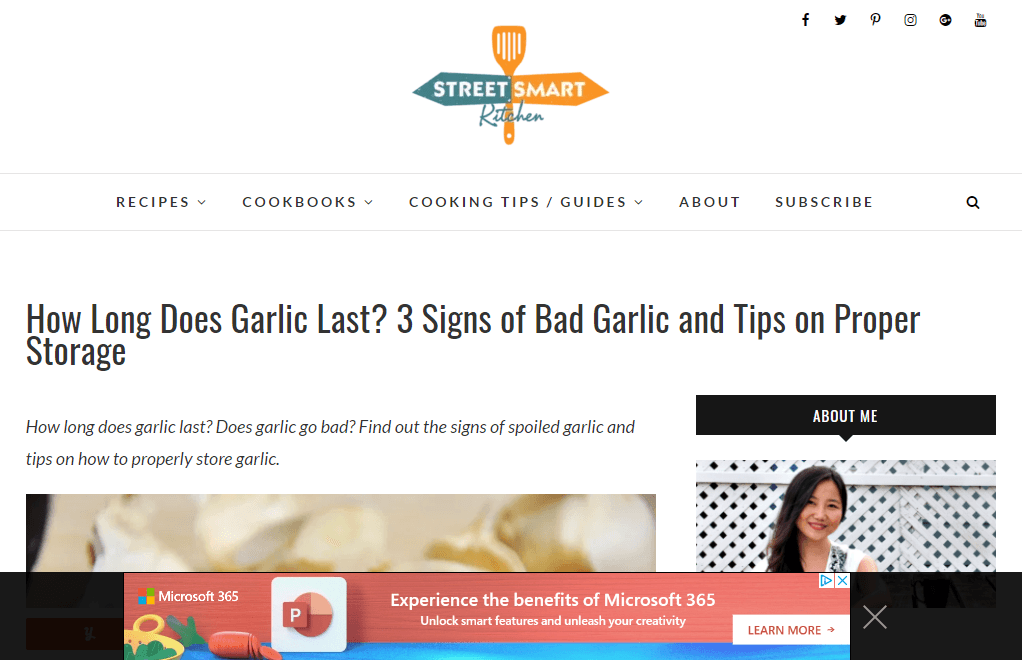
There are dozens of ads and multiple irrelevant paragraphs on this "blog" before you get to the real answer.
If you've ever looked for a recipe on Google, you know exactly what I'm talking about. Ads, newsletter signups, auto-playing videos, and other frustrating practices clutter your screen.
About half way down the page, nestled between 8 different ads, is the answer I was looking for:
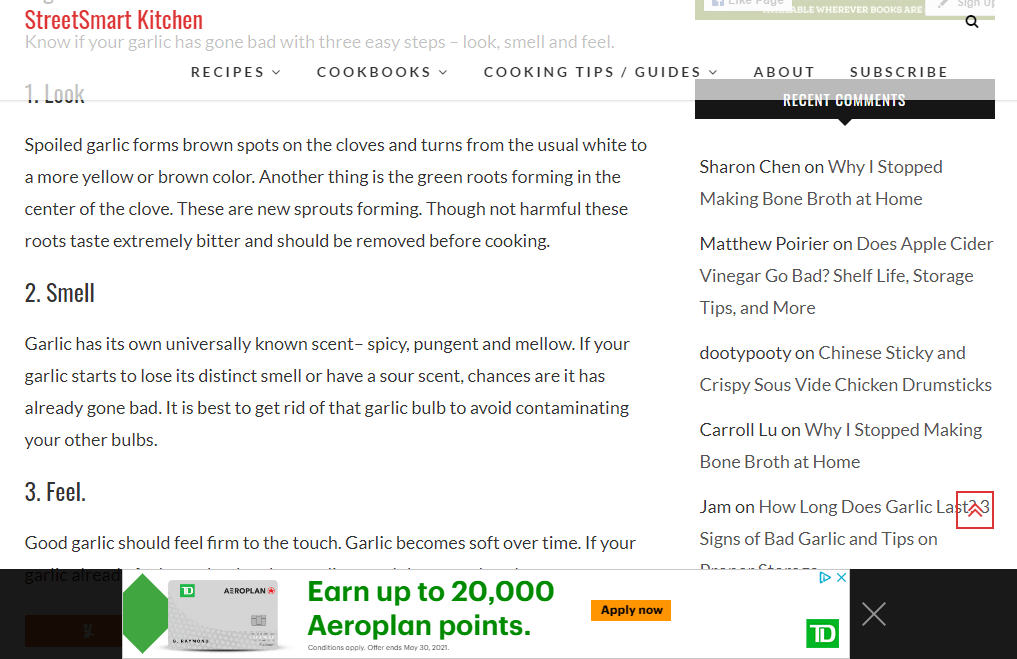
A gigantic, bloated website full of ads. Just to display three sentences of information.
Worst of all, I have no confidence that this information is correct.
If I look at the rest of Google's search results, I get similar bloated content likely copied from some old original source long forgotten.
Content Marketing
None of this is by accident. These websites optimize for revenue, not information quality.
I can't blame them. Running a website like this is a full time job, it costs money.
But it sucks.
This is the end-game of search engine optimization (SEO) & content marketing.
The owner of this website has spent a lot of time & money optimizing their content to get to the top of Google. Information & user experience are ignored in favor of delicious revenue.
They usually hire cheap "copy" writers, paying pennies per word, who then spend time crafting "posts" with filler content in an attempt to hit the right keywords.
These people then make deals with other websites to link to one another, thereby increasing their reputation in the eyes of Google's search algorithm.
Sometimes they even employ "black hat" techniques to trick Google into thinking their site is reputable. These techniques eventually get filtered out, but not before the website makes hundreds of thousands of dollars in ad revenue.
Moreover, you can see this person has created some sort of e-book to purchase, as well as a newsletter you can sign up for.
I'm a big fan of e-books (I even wrote one), but it further proves that this website is primarily a marketing funnel rather than a source of information.
Affiliate Marketing
If you go in a different direction, you get much of the same low quality content.
Let's try to find a good webcam to purchase.
Search query: Best webcam 2021
Top link on Google is Tech Radar. They seem reputable, right?

As you can see, some giant banner ad didn't load. I have my adblocker off too.
Oh well, let's scroll down.
The following content is entirely useless. These paragraphs are used entirely to capture as many keywords as possible:
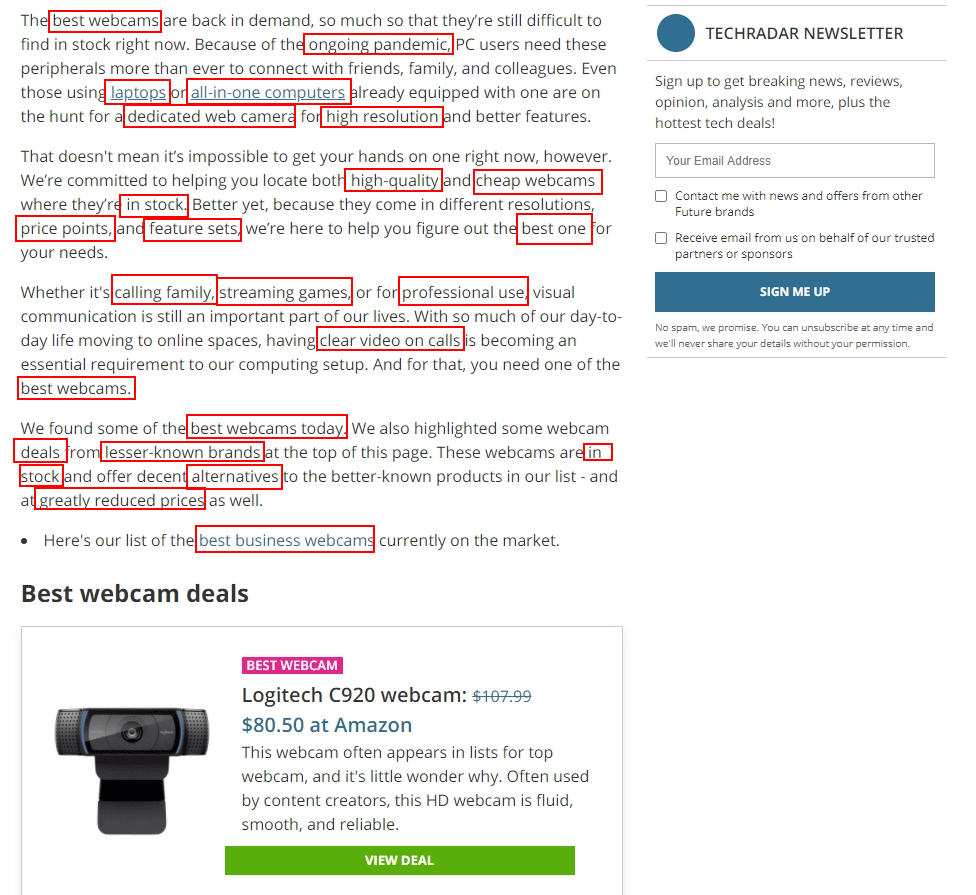
Scroll down more and you finally get to their list:
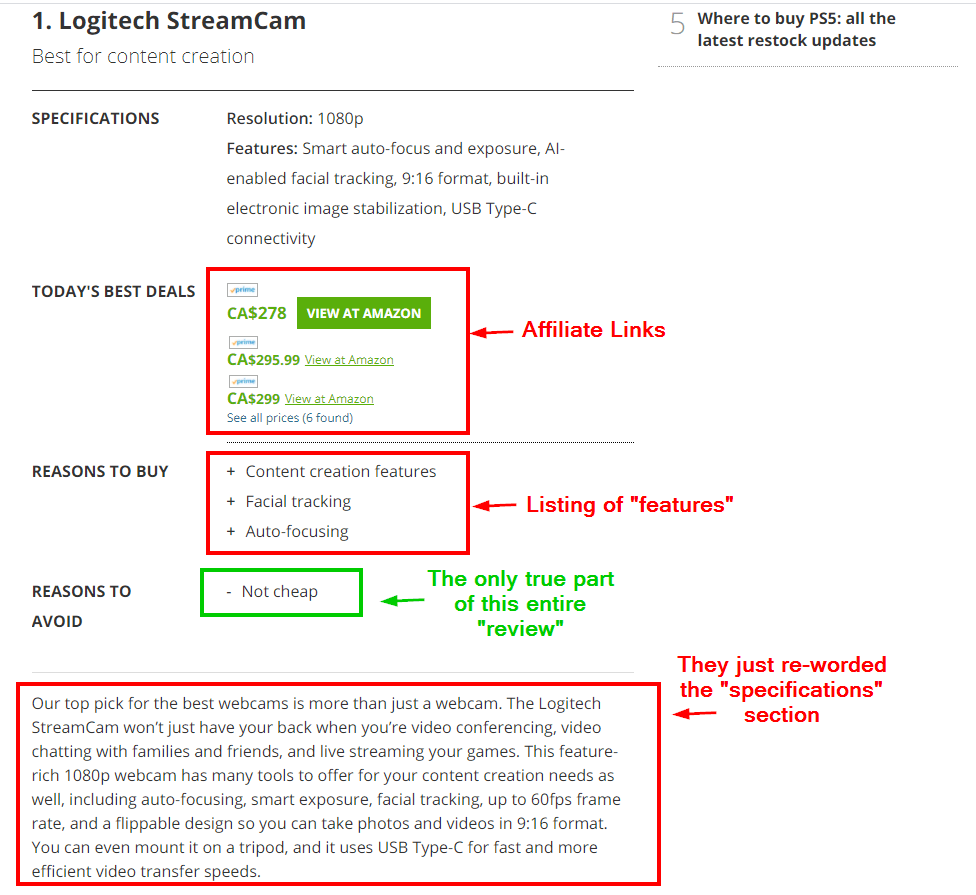
None of this content says anything. Whoever they paid to write this article just copied the marketing pamphlet and re-worded it into a paragraph, and made a "review".
In the middle there, you can see the armada of Affiliate Links.
Affiliate links take you to some website (usually Amazon) where the blog gets a referral fee if you end up buying something.
TechRadar's priority with this article is to funnel you to Amazon, not to provide you with good information.
The rest of their "article" just lists more webcams with no discernible order. I suspect the most expensive webcam is at the top, since it brings in the most affiliate revenue.
And by the way, the products they list here aren't even the best webcams.
Why do people do this?
There is a ton of money to be made with ad revenue and affiliate marketing. I really don't blame them.
Most of the blame goes to Google, but they also have the insurmountable task of trying to index billions of webpages in an orderly, useful way. It's not easy, but they also make a ton of money on the ads people serve on their results.
Does Google want this to happen? Probably not, but they're also not in a big hurry to fix it.
What I noticed myself doing
What I noticed myself doing was adding "...reddit" to the end of my search queries.
Before: Best webcam 2021
After: Best webcam 2021 reddit
The top comment on the first result I found on Google:
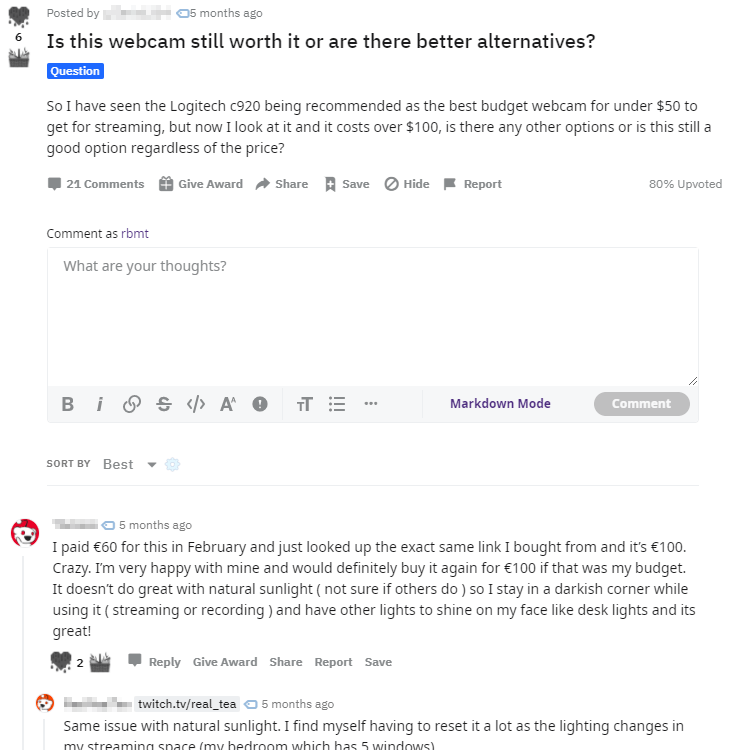
While this discussion is far less relevant, this discussion is dramatically more organic. There are no affiliate links here, just people's opinions.
Why Reddit? It's a place where real user post their real opinions. There is (usually) no incentive for commenters to lie about information like this.
It's true, there is tons of astroturfing all across Reddit. But low quality answers are (usually) downvoted, forcing any shilling to be much more costly and rare. Highly opinionated, honest users are also quick to call-out clearly false or poor quality information.
It's imperfect, but I find myself trusting online comments on sites like Reddit, StackOverflow, and other community forums much more than "official" looking blogs or articles.
Other solutions
I love StackOverflow, and I use Reddit quite a bit. Quora should theoretically solve this problem too.
Both of these websites have their places, but there are a few problems.
- Reddit is based around current events. Posts eventually get archived, closing off the discussion for future updates or insights.
- StackOverflow is mostly about programming, but doesn't have (much) support for threaded discussion. The community is also hostile, and answering questions requires "reputation" scores. I'm not sure why the community is hostile, but I've had many bad experiences on there myself.
- At some point Quora started paying people for making posts via their "Partner Program". The more traffic you drew in, the more money you made. This is the same incentive structure that ruined Google search results. In fact, you can see how terrible the quality is by looking at the Partner Program explanation question.
What I'm doing about it
I'm building a website called Neoscroll.
(I chose the name because it sounded cool.)
It is an intentionally minimalistic question and answer website taking inspiration from the variety of imperfect solutions I've found.
People can ask questions, post nested comments, upvote/downvote, add reactions, and more. People who create questions can mark responses as "Best Answer" as well.
Here's some examples:
Irrelevant/meme questions are downvoted. Good questions/answers are upvoted. There is no expiration on posts or comments, although older answers will be marked as outdated somehow. There's still tons to figure out.
I'm also trying to find an incentive structure for community members to join and post. Right now many of the questions and answers are my own, plus a handful of friends playing around with it.
My initial ideas to incentivize high quality content:
- Users can buy special awards for good questions or answers, with some percentage of that revenue going to the awardee.
- Put ads on the website, users get a cut of ad revenue for their viewed posts (this is a bad idea, but worth noting)
- Allow users to buy special account icons/flairs to look cool
- Users can post question "bounties" where they pay a select amount to the user who answers the question the best
- Sponsored answers (not a fan of this)
- Something else?
I'm still playing around with ideas, but I feel like there's something here.
My goal is to build a website that has high quality information, while simultaneously rewarding users who post honest, good content.
Plus, I would love to totally destroy these crappy blogs and articles that have cause me and others so much frustration.
If you have any questions, I'd love to see some posts on the Neoscroll category.